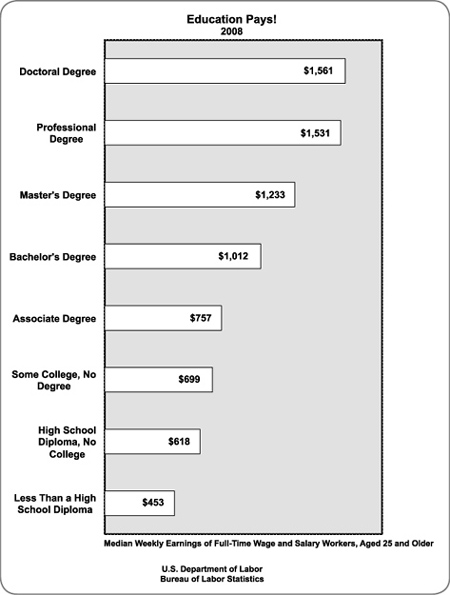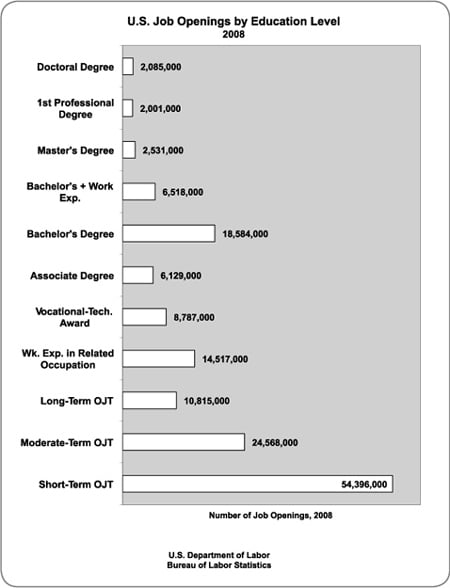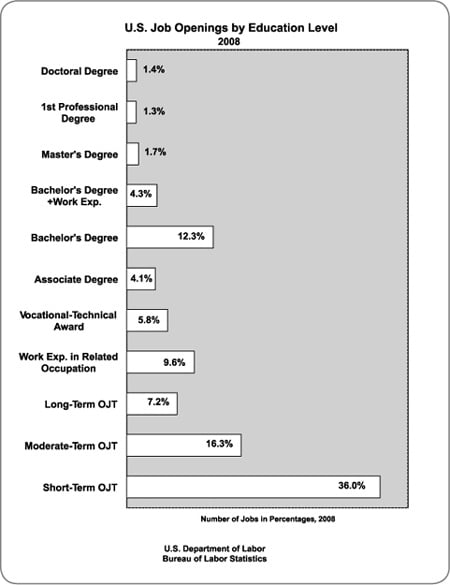1. How Informational Interviewing Can Help with Career Goals
Don’t worry if your child’s initial career
goal seems unrealistic or out of reach. Most young people have an
extremely limited view of what’s “out there.” Research suggests that
most teenagers think they will enter one of 12 careers, most of which
are in the professional ranks. These careers are doctor, lawyer,
business executive, teacher, athlete, engineer, nurse, accountant,
psychologist, architect, musician, and actor/director. Because these
careers account for less than 20 percent of all jobs in the U.S.
economy, with doctor and lawyer accounting for less that 1.3 percent of
all jobs, many young people will not achieve their stated goal.
This does not mean they are doomed to a life
of drudgery if they don’t achieve their initial goal. It means they
need to identify a wider range of careers. They need to develop a Plan
B.
Informational interviews help your child do
this. They help your child validate or reject an initial career idea.
They lead to related career ideas for exploration. They provide
information about the values important to your child and the activities
that seem interesting. They expand your child’s self-understanding by
holding up a “mirror” of an adult who is working in a career day to
day. They lead to new contacts for informational interviews.
Here is how the informational interview process played out for Megan:
“When I went to college, I didn’t know what I
wanted to do. I was interested in so many things—it was hard to choose.
I thought about being a doctor and about being a teacher. I also
thought about being a businesswoman.
“I started to talk to people about what they
did for a living. I think my dad set up a couple of interviews for me
in the beginning, and I just continued from there. I ruled out doctor
because I decided that it would be hard to have kids with that kind of
lifestyle. I thought about teaching, but after talking to several
teachers it seemed like I wouldn’t be learning enough new things on the job, that you kind of taught the same content each year with some variation.
“I really wanted to be a physician’s
assistant, but the college I was attending didn’t have a program in
that area. All the while I was talking to people, I kept taking those
little career tests on the Internet that told you what you would be
good at. I looked at Web sites that told you what the “hot” jobs were
supposed to be in the next 10 years.
“Course-wise, I just took the basics my first
year in college while I figured out what I wanted to do. By the first
semester of my sophomore year in college, I still hadn’t decided, so I
sat down and asked myself, ‘What have you learned about yourself in all
your conversations so far? Is there anything that might combine all the
things that interest you?’
“I kept coming back to speech therapy. I had
talked to several speech therapists during my research. I knew that as
a speech therapist I could work with a wide variety of people, from
babies to the elderly. I would constantly be learning new things. I
could work in clinical practice and later go on to teach if I wanted to
or open my own business as a speech therapist. It looked like there
would always be jobs in this field. While my income level would
eventually plateau—I wasn’t going to get rich as a speech therapist—it
looked like I would always have a job, one that could be part-time when
I had kids. So that’s what I decided to do. I got a bachelor’s degree
in communication disorders and went on to get my master’s.
“I think the key was just talking to lots and lots of people. All in all, it worked out for me really well.”
Informational interviewing isn’t rocket
science. It’s simply a matter of going out and talking to as many
people as possible about different careers and seeing where those
conversations lead next. Each informational interview will generate new
ideas. It’s like going to the public library and looking through the
stacks.
In addition to directing your child
to new career ideas, informational interviewing will give your child a
more accurate view of the job market. This will enable her to make more
informed decisions and you to control college costs.
2. What Does the Job Market Look Like?
Most young adults have a very one-sided picture of the job market. This view of the job market (Chart 1) shows them that education pays.

Chart 1: Median weekly earnings of full-time workers, 2008.
What young people don’t
have is a picture of the actual distribution of job openings in the
U.S. economy by education and training level. Charts 2 and 3 show the actual distribution of jobs in the United States in 2008.

Chart 2: U.S. jobs by education level, 2008.

Chart 3: U.S. job openings by education level in percentages, 2008.
The fact is that 52
percent of all jobs in the United States in 2008 required only
short-term (less than one month) to moderate-term (one to twelve
months) informal or on-the-job training (OJT).
Another 26 percent of all jobs in 2008
required technical training ranging from long-term OJT (1–5 years OJT,
in-house training, or apprenticeship) to an associate degree.
Twenty-one percent of all jobs in 2008
required a bachelor’s degree or higher. Less than 4.5 percent of jobs
required a master’s degree or higher. The median earnings of all
full-time U.S. workers in 2008 were $32,390 per year, or $15.57 per
hour. Half of all workers made more than this amount and half made less.
Both you and your child need to understand
that this is the job market your child will face. Only then will you be
able to help your child make realistic and effective plans. While there
are many exciting career opportunities today, they will be open only to
young people with the right combination of education, work experience,
and people skills to do the jobs employers want done.
It is important to understand that the BLS
Jobs by Education Level data on in 2008 reflects the education and
training that the BLS and industry experts say is necessary for
proficient performance of the job. It does not reflect the level of
education of people actually doing the job.
The level of education of individual workers
is sometimes higher and sometimes lower than the job requires. An
example would be a computer programmer (bachelor’s degree training
required) who entered the computer field 25 years ago without a degree
and worked up through the ranks. At the same time, a bachelor’s degree
computer programmer whose job was shipped to India in 2001 may now be
working as a sales clerk in a home improvement store. This job requires
only short-term OJT. According to the 2008 BLS data, more than 6.3
million adults with a bachelor’s degree or higher were working in jobs
requiring only short-term OJT. This is called “underemployment.”
Chances are the distribution of jobs presented in Chart 2
is not what you expected. With all the pressure on young people to get
a college degree, you probably expected more bachelor’s degree jobs to
be out there. You have watched well-paying manufacturing jobs being
shipped overseas or eliminated by technology over the past 25 years,
and you have placed your hopes for your child achieving a middle-class
lifestyle on her earning a four-year bachelor’s degree. And you are
willing to borrow increasingly large sums of money to help your child
achieve this goal.
The truth is that many
young people who start college leave without achieving their stated
educational goal. Seventy percent of high school graduates enroll in
college within two years of graduating from high school. Most of these
students intend to get a bachelor’s degree or higher. More than half of
all students who start college leave without completing a degree or
certificate. At a community college, the number of students who leave
without earning a degree or certificate can climb as high as 75
percent. Many young adults, especially those without a career plan or
focus, will try college, drop out, and drift down into the economy.
They will end up working in jobs requiring only short-term or
moderate-term OJT because this is where the majority of jobs are.
What can you, as a parent, do to help your child achieve a positive outcome after high school?
You can encourage your child to
spend as much time researching careers and industries as researching
colleges. You can help your child gather accurate, real-world
information to inform her decisions. You can help her connect with
people who work in a variety of careers and industries to find out what
is going on. The easiest way to do this is through informational
interviewing.